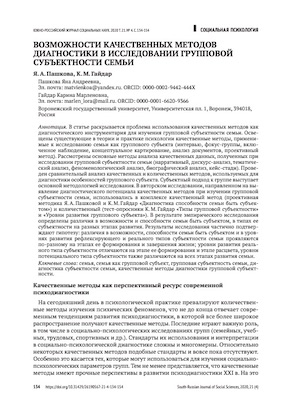Abstract
The article reveals the problem of applying qualitative methods as diagnostic tools for studying the group subjectivity of the family, as well as covers the qualitative methods in the theory and practice of psychological science that are used in the study of the family as a group subject (interviews, focus groups, included observation, conceptual mapping, document analysis, and the projective method). The main methods of analysis of qualitative data obtained in the study of family group subjectivity, viz., narrative analysis, discourse analysis, thematic analysis, phenomenological analysis, biographical analysis, and case study) were considered. A comparative analysis of qualitative and quantitative methods used to diagnose the characteristics of a group subject was carried out. The basic methodology of the research is the subjective approach to the group. In the author’s study, aimed at revealing the diagnostic potential of qualitative methods in the study of the group subjectivity of the family, two methods were used as a unit: qualitative — the projective technique (Y. A. Pashkova and K. M. Gaidar “Diagnostics of the ability of a family to be the subject») and quantitative — test-questionnaires worked out by K. M. Gaidar (“Types of group subjectivity” and “Development levels of the group subject”). The empirical research has identified differences in the potential and ability of the family to be the subject, and in the types of its subjectivity at different stages of development.
Keywords
References
- Braun, V. & Clarke, V. (2006). Using Thematic Analysis in Psychology. Qualitative Research in Psychology, 3, 77–101.
- Bubnov, A. L. (2019). Opyt proyektivnogo izucheniya sotsial’noy identichnosti gruppy [Experience of the Projective Study of the Social Identity of a Group]. In Sotsial’naya psikhologiya: voprosy teorii i praktiki. Materialy IV Yezhegodnoy nauchno-prakticheskoy konferentsii pamyati M. YU. Kondrat’yeva (13–14 maya 2019 g.) (pp. 36–38) [Social Psychology: Questions of Theory and Practice. Materials of the IVth Annual Scientific and Practical Conference in Memory of M. Yu. Kondratiev (May 13–14, 2019)]. Moskva: FGBOU VO MGPPU.
- Bubnov, A. L. (2020). Opyt primeneniya graficheskoy diagnostiki pri izuchenii sotsial’noy identichnosti gruppovogo sub’’yekta [Experience of Using Graphical Diagnostics in Studying the Social Identity of a Group Subject]. In Bubnov (Ed.) Vestnik nauchnoy sessii fakul’teta filosofii i psikhologii [Bulletin of the Scientific Session of the Faculty of Philosophy and Psychology] (c. 51–58). Voronezh: Izd. dom VGU.
- Burck, C. (2005). Comparing Qualitative Research Methodologies for Systemic Research: The Use of Grounded Theory, Discourse Analysis and Narrative Analysis. Journal of Family Therapy, 27, 237–262.
- Creswell, J. W. (2014). Research Design. Qualitative, Quantitative, and Mixed Methods Approaches. Los Angeles: SAGE Publications, Inc.
- Gaydar, K. M. (2011). O diagnosticheskikh vozmozhnostyakh proyektivnykh metodik v issledovanii gruppovoy identichnosti [On the Diagnostic Possibilities of Projective Techniques in the Study of Group Identity]. In Bubnov (red.) Vestnik nauchnoy sessii fakul’teta filosofii i psikhologii [Bulletin of the Scientific Session of the Faculty of Philosophy and Psychology] (c. 15–22). Voronezh: Izd. dom VGU.
- Gaydar, K. M. (2012a). Sotsial’no-psikhologicheskaya diagnostika gruppovogo sub’’yekta: uchebno-metodicheskoye posobiye dlya vuzov [Socio-Psychological Diagnostics of a Group Subject: An Educational and Methodological Guide for Universities]. Voronezh: IPTS VGU.
- Gaydar, K. M. (2012b). Aktual’nyye problemy psikhologicheskoy diagnostiki gruppovogo sub’’yekta [Current Problems of Psychological Diagnostics of Group Subject]. Global’nyy nauchnyy potentsial [Global Scientific Potential], 7(16), 16–18.
- Glaser, B. G., Strauss, A. L. & Strutzel, E. (1968). The Discovery of Grounded Theory; Strategies for Qualitative Research. Nursing research, 17(4), 364.
- Harlamenkova, N. E. (2014). Analiz edinichnogo sluchaya kak metod issledovaniya lichnosti [Analysis of a Single Case as a Method of Personality Research]. Zhurnal prakticheskogo psikhologa [Journal of the Practical Psychologist], 2, 9–24.
- Horoshilov, D. A., Balashova E. Ju. (2018). Kachestvennye metody v social’noy i klinicheskoy psikhologii: prolegomeny k mezhdistsiplinarnomu dialogu [Qualitative Methods in Social and clinical Psychology: Prolegomena to Interdisciplinary Dialogue]. Social’naya psikhologiya i obshchestvo [Social Psychology and Society], 9(3), 21–30. DOI: 10.17759/sps.2018090303.
- Husserl, Je. (1999). Idei k chistoy fenomenologii i fenomenologicheskoy filosofii [Ideas for pure phenomenology and phenomenological philosophy]. Moskva: DIK.
- Kasavin, I. T. (2007). Diskurs-analiz i yego primeneniye v psikhologii [Discourse Analysis and its Application in Psychology]. Voprosy psikhologii [Voprosy psikhologii], 6, 97–119.
- Klyuyeva, N. V. (2016). Kachestvennye metody issledovaniya: uchebno-metodicheskoe posobie [Qualitative Research Methods: Educational and Methodical Manual]. Jaroslavl’: JarGU.
- Miroshnichenko, O. A. (2014). Metodologicheskiye i metodicheskiye problemy issledovaniya aktualizatsii mnogourovnego gruppovogo sub’’yekta v razlichnykh sotsial’nykh usloviyakh [Methodological and Methodical Issues of The Research on Actualization of Multilevel Group Subject Under Different Social Conditions]. Nauchnyy zhurnal KubGAU [Polythematic Online Scientific Journal of Kuban State Agrarian University], 100(06), 1–18.
- Moon, B., Hoffman, R., Novak, J., Canas, A. (2011). Applied Concept Mapping. Capturing, Analyzing, and Organizing Knowledge. Boca Raton-London-New York: CRC Press.
- Neuman, W. L. (1991). Social Research Methods: Qualitative and Quantitative Approaches. Boston: Allyn and Bacon.
- Pashkova, Ya. A. (2018). Sem’ya kak gruppovoy sub’’yekt: sotsial’no-psikhologicheskiy analiz [Family as a Group Subject: A Socio-Psychological Analysis]. In Aktual’nyye voprosy pedagogiki, psikhologii, sotsiologii. Materialy vtoroy mezhdunarodnoy nauchno-prakticheskoy konferentsii [Topical Issues of Pedagogy, Psychology, and Sociology. Materials of the Second International Scientific and Practical Conference] (pp. 282–287). Dagestan: DGPU.
- Shiutts, A. (2003). Smyslovaya struktura povsednevnogo mira: ocherki po fenomenologicheskoy sociologii [The Semantic Structure of the Everyday world: Essays on Phenomenological Sociology]. M.: Institut Fonda “Obshchestvennoe mnenie”.
- Sidorenkov, A. V. (2014). Sotsial’no-psikhologicheskaya diagnostika malykh grupp. Metodicheskiy instrumentariy: uchebnoye posobiye [Socio-Psychological Diagnostics of Small Groups. Methodological Tools: A Textbook]. Rostov-na-Donu: Izd-vo Yuzhnogo federal’nogo universiteta.
- Ulanovskiy, A. M. (2009). Kachestvennye issledovaniya: podhody, strategii, metody [Qualitative Research: Approaches, Strategies, Methods]. Psikhologicheskii zhurnal [Psikhologicheskii zhurnal], 30(2), 18–28.
- Zhuravlev, A. L. (2009). Kollektivnyy sub’’yekt: osnovnyye priznaki, urovni i psikhologicheskiye tipy [Collective Subject: Main Features, Levels and Psychological Types]. Psikhologicheskiy zhurnal [Psikhologicheskiy zhurnal], 30(5), 72–80.
 Русский
Русский


